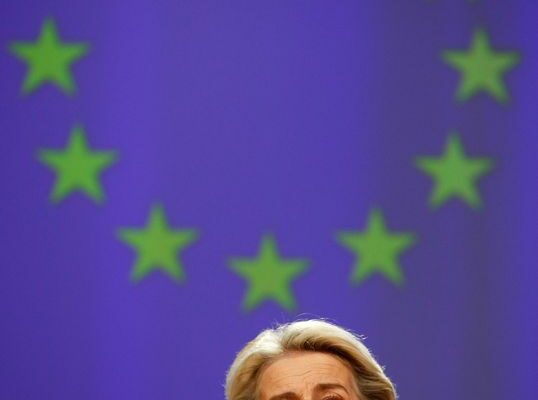BERLIN/BRUSSELS (Reuters) – The European Commission has drawn up a plan to authorize the sale of new combustion-engined cars after 2035 if they run on carbon-neutral “e-fuels” (synthetic fuels), according to an executive document European.
The draft proposal, which Reuters learned on Tuesday, suggests creating a new type of vehicle category in the European Union for cars running only on carbon-neutral fuels.
Yielding to German pressure, the Commission suggests that such vehicles could be among those authorized from 2035, on the condition that their technology is capable of preventing them from rolling if other fuels are used, indicates the document describing the proposals from the EU executive to the German Ministry of Transport.
After months of negotiations, EU countries and the European Parliament agreed last year on a law to ban the sale of new combustion engine cars and vans in the EU from 2035, but its entry into force was suspended earlier this month after unexpected opposition from Germany.
The German Transport Ministry’s main demand is for the EU to allow the sale of new e-fuel cars after 2035. On Tuesday, it said it was in contact with the Commission to try to find a solution on this issue. followed closely by the powerful German automobile industry.
“We’re interested in a quick clarification, but it needs to be strong and binding. We’re looking into the matter carefully,” a spokesperson said.
Two sources familiar with the matter explained that the Commission’s condition that cars must be able to recognize CO2-neutral fuels from fossil fuels was problematic for Germany. It would largely force car manufacturers to develop new engines.
German Transport Minister Volker Wissing does not want to completely reject the Commission’s proposal, but rather make some improvements to it, the sources told Reuters.
The parties want to reach an agreement by the EU summit on Thursday.
A Commission spokesperson declined to comment on the draft document. He did, however, refer to comments by Frans Timmermans, executive vice-president for the European Green Deal, who said last week that any solution had to comply with the 2035 phase-out law, agreed last year.
“Discussions are continuing between the Commission and the German authorities,” the spokesperson said.
An EU official told Reuters on Monday that any proposals on registering e-fuel cars would only be made after the combustion engine phase-out law is finally passed.
E-fuels (or “e-fuels”) are made by synthesizing captured CO2 emissions and produced hydrogen from CO2-free electricity.
They are not yet produced on a large scale. A study published Tuesday by the Potsdam Institute for Climate Research found that all planned e-fuel projects worldwide would produce only enough fuel to cover 10% of Germany’s e-fuel demand for aviation, shipping and chemicals over the next few years.
(Report Markus Wacket and Kate Abnett, written by Riham Alkousaa, French version Gaëlle Sheehan, edited by Diana Mandiá and Kate Entringer)
©2023 Thomson Reuters, all rights reserved. Reuters content is the intellectual property of Thomson Reuters or its third party content providers. Any copying, republication or redistribution of Reuters content, including by framing or similar means, is expressly prohibited without the prior written consent of Thomson Reuters. Thomson Reuters shall not be liable for any errors or delays in content, or for any actions taken in reliance thereon. “Reuters” and the Reuters Logo are trademarks of Thomson Reuters and its affiliated companies.
